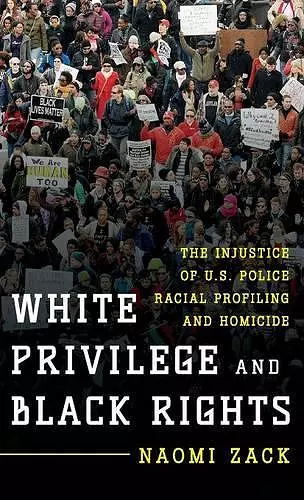White Privilege and Black Rights
The Injustice of U.S. Police Racial Profiling and Homicide
Format:Hardback
Publisher:Rowman & Littlefield
Published:23rd Apr '15
Currently unavailable, and unfortunately no date known when it will be back
This hardback is available in another edition too:
- Paperback£25.00(9781442250574)

Examining racial profiling in American policing, Naomi Zack argues against white privilege discourse while introducing a new theory of applicative justice. Zack draws clear lines between rights and privileges and between justice and existing laws to make sense of the current crisis. This urgent and immediate analysis of the killings of unarmed black men by police officers shows how racial profiling matches statistics of the prison population with disregard for the constitutional rights of the many innocent people of all races. Moving the discussion from white privilege discourse to the rights of blacks, from ideas of white supremacy to legally protected police impunity, and from ideal and non-ideal justice theory to existing injustice, White Privilege and Black Rights examines the legal structure that has permitted the killings of Trayvon Martin, Michael Brown, Eric Garner, Tamir Rice, and others. Deepening understanding without abandoning hope, Zack shows why it is more important to consider black rights than white privilege as we move forward through today's culture of inequality.
Lucid assessment...[of racism] is hard work and not for the faint of spirit. Naomi Zack’s White Privilege and Black Rights: The Injustice of U.S. Police Racial Profiling and Homicide is a case in point. It consists of three essays plus a preface and conclusion. Remarks by the author indicate it was prepared in the final weeks of last year, with the events in Ferguson, Mo., fresh in mind. But don’t let the title or the book’s relative brevity fool you. The author is a professor of philosophy at the University of Oregon -- and when she takes up terms such as 'white privilege' or 'black rights,' it is to scrutinize the concepts rather than to use them in slogans. Despite its topicality, Zack’s book is less a commentary on recent events than part of her continuing effort to think, as a philosopher, about questions of race and justice that are long-standing, but also prone to flashing up, on occasion, with great urgency -- demanding a response, whether or not philosophers (or anyone else) is prepared to answer them. * Inside Higher Ed *
Odds are by the time you read [this review] another young Black man will have been shot and killed by a police officer. It is out of this fierce sense of urgency that Naomi Zack wrote White Privilege and Black Rights. Her short book reads more than anything else as a desperate attempt to understand the current crisis facing young Black men and the police officers who kill them…. While she may describe its focus as narrow, the book’s conceptual and methodological ambit is broad, encompassing philosophy, legal analysis, history, and public policy…. Such a critique it seems must be exterior to the legal process. One hopes that as a legal outsider, Zack continues her important contribution to such a critique. * Criminal Law and Criminal Justice Books *
We associate philosophy with insights into timeless matters, but philosophy is also capable of sharply illuminating the here and now. In this courageous intervention in the debate on a subject that has galvanized national attention—the police killings of unarmed young black men—philosopher Naomi Zack challenges conventional wisdom both black and white, urging a rethinking of our conceptions of white privilege and the best approach to theorizing social justice. -- Charles W. Mills, CUNY Graduate Center
Through her fundamental belief in equal protection for all human persons, Naomi Zack demands our attention with a legal, political, and ethical vision that does not falter. Indeed, in this text—one that invites critical discussion and controversy regarding such contemporary, philosophically, and politically hot topic issues as white privilege—Zack is committed to clarifying, critiquing and undoing the continued weight of injustice. -- George Yancy, professor of philosophy, Emory University
ISBN: 9781442250550
Dimensions: 221mm x 147mm x 14mm
Weight: 322g
154 pages